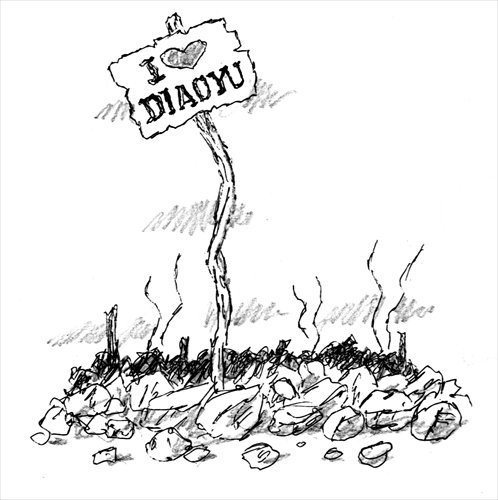Pro-Diaoyu housing tactics fail to rescue rule of law

Illustration: Peter C. Espina/GT
As seen through a widely circulated photograph of a stone tablet at a dusty construction site in Ganzhou, East China's Jiangxi Province, the words on an abandoned makeshift sign reads: "The Diaoyu Islands belong to China, and this house belongs to Xie Taiyang."
Xie's house is missing from the photo, and only the tablet, standing by its lonesome, stuck in the ground as the last failed endeavor to ward off forced demolition, remains.
In recent years, such signs have spurted up, marked with attention-grabbing messages as homeowners resort to whatever words necessary, in a bid to save their homes, and for some, what they believe are their sanctuaries.
Even portraits of Chairman Mao have been put up - reviving an old strategy used by curators during the Cultural Revolution (1966-76) to deter Red Guards from smashing priceless cultural relics - while others opt to hang the chairman's Selected Works of Mao Zedong, citing a passage in it from Mao, who argued against enforced demolitions in 1956 at a central Party meeting.
Others have turned to "true patriotism" to protect what is theirs.
In March last year, homeowner Ji Qingyu in Dongying, East China's Shandong Province, who placed six red flags - each adorned with five golden stars - on his roof, put out the message: "I love the Communist Party of China; I love the Central People's Government."
Two years before that, an entire community in Yancheng, East China's Jiangsu Province, collectively built an observation post.
But like most of the efforts, both proved useless in preventing local demolition authorities from ultimately carrying out their tasks.
Though nothing new, the bold appeal of the sign in Ganzhou, claiming sovereignty over the hotly contested islands, is perhaps the latest indication that more residents are growing restless in the face of resettlement woes which are seen by the majority as unfairly uprooting people from their homes.
Some may argue that the boards are signs of cowardliness, written by people who are too weak to confront the "almighty" local demolition officials, choosing instead to hide behind their desperate ploys.
Nonetheless, the pitiful truth is that the situation underscores the absence of a firm rule of law in China during these trying times. Neither residents nor local authorities are solving the thorny issues via the legal system.
Local demolition officers have been criticized for bending the rules to manage housing disputes. In many local areas, authorities purposely fail to publicize information regarding relocation compensation schemes, in effect avoiding a transparent process as they separate neighbors and talk to households one at a time - striking deals in secrecy.
The same logic applies to residents. In fact, even residents who do not oppose demolition - resort to secretive ways to improve their chances of getting more compensation.
Back in my hometown city of Jiangsu Province, an ongoing development project has pushed several of my high school classmates out of their homes and into rented apartments.
While many affected residents are busy envisioning what kind of new house they will be compensated with, some are also busily erecting temporary shacks in their small yards so that more square meters of their property are counted when authorities come.
By seeking out loopholes, both sides are guilty of ignoring the rules, even if they are lacking a strong presence. It is a vicious cycle, but one that will surely not be broken by the presence of more "pro-Diaoyu Islands" signs at demolition sites.